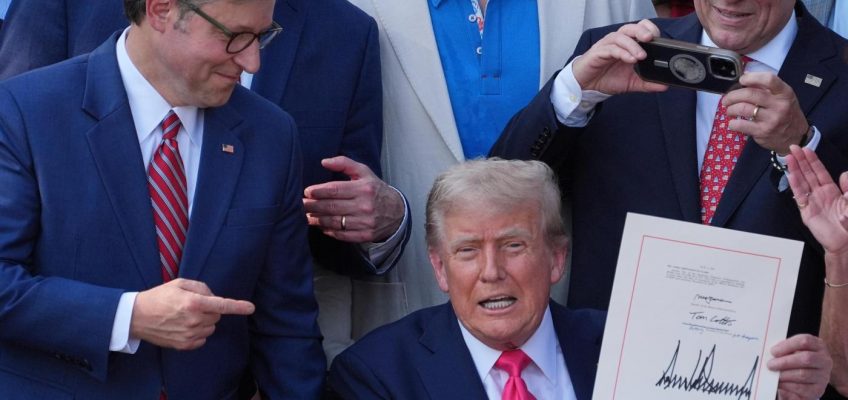Aside from hype artists and White House spokespeople, it’s hard to find true enthusiasm for the sweeping new policy law, even among Republicans who voted for its passage. But because almost all Republicans did vote for it, with even the supposed deficit hard-liners mostly falling into line, the strongest remaining critiques are coming from the center and the left, with a special focus on the legislation’s cuts to Medicaid.
Given President Donald Trump’s promises to protect that program and the importance of Medicaid for many voters in his coalition, that’s the place of greatest political vulnerability and the likeliest source of short-term blowback.
But to highlight the law’s failure to address some of America’s most important problems, I want to imagine a different set of critiques, more associated with forms of conservatism than with liberalism or the left.
First (in the voice of a defense hawk), the law doesn’t do nearly enough for defense.
Defense
The United States is facing the most difficult geopolitical environment since the end of the Cold War, with multiple hot zones where our weaponry is needed and the threat of a rival superpower girding for potential war. Yet our defense budget is puttering along somewhere between 3% and 4% of gross domestic product, well below what we spent in the Reagan era and the war on terrorism years, let alone the early Cold War.
The new law does increase military spending, but as a one-time boost, not a sustained strategic commitment. That’s an insufficient response to our challenges in the Middle East, Ukraine and Asia, and a larger failure of vision in a multipolar age.
Family and fertility
Second (in the voice of a social conservative), the law doesn’t do enough for family and fertility.
No problem shadows the world right now like demographic collapse, and while the United States is better off than many countries, the birthrate has fallen well below replacement levels here as well. Family policy can’t reverse these trends, but public support for parents can make an important difference. Yet the law’s extension of the child tax credit leaves it below the inflation-adjusted level established in Trump’s first term.
This is especially egregious when you factor in the post-Roe v. Wade context, in which anti-abortion states have taken policy steps to support expectant mothers, but no national effort has emerged to match. Leaving abortion regulation to the states makes sense as a provisional political settlement, but leaving pro-family policy to the states (when anti-abortion states are poorer than average and harder-pressed to offer support) is a dereliction.
Entitlement programs
Finally (in the voice of Paul Ryan), the law doesn’t touch the entitlement programs that are actually bankrupting America.
If it’s reasonable to look for budgetary savings in Medicaid, it’s essential to look for savings in Medicare and Social Security. The future of American dynamism depends on preventing our commitments to retirees from crushing youthful entrepreneurship and family formation. But the new legislation goes in the opposite direction. Instead of means-testing entitlements, it offers temporary tax deductions to seniors, pandering to gerontocracy rather than resisting it.
In a healthier conservatism, all these critiques would have played a larger role in the megabill’s debate. And the American policy environment depends on conservatives engaging in these arguments, because they reflect a set of concerns that are more natural to the right than to the left.
Never raising taxes on the rich
But they are all connected to an issue where what comes naturally to conservatism is part of the problem, not the solution — the issue of taxation, and the absolute priority that the Republican Party still gives to never raising taxes on the affluent and rich.
That absolutism was tempered somewhat in Trump’s first term by the sensible cap on the state and local tax deduction. But the new legislation raises that cap and offers a larger tax break for heirs and heiresses in addition to extending the first term’s tax rates — and the law’s tax-revenue raisers are picayune by comparison.
Related Articles
Barnett, Kristof: It isn’t freedom if it’s not for everyone
Thomas Friedman: How Trump’s ‘big beautiful bill’ will make China great again
Kristof, Barnett: The quiet girls’ revolution in west Africa
Lisa Jarvis: RFK Jr.’s vaccine panel is turning misinformation into policy
Mary Ellen Klas: Thom Tillis knew what the GOP refused to hear
Just about the only notable right-wing media figure to question these priorities was Steve Bannon, and he was absolutely right. It is a policy impossibility, under inflationary conditions, to combine the existing commitments of Trumpism with the need to address national security threats and demographic decline if you rule out any tax increase.
It is a political impossibility to push through the entitlement reforms that the wisest Republicans would support, which would necessarily reduce benefits for some middle-class retirees, without asking affluent taxpayers to share some of the pain.
And it is coalition-shrinking folly for the GOP to persistently cut programs that benefit its own voters while always lightening burdens on wealthier voters who are trending toward the Democrats.
But it’s also clearly just Republican bedrock, enduring even through all the wild gyrations of the Trump era, awaiting some larger political or fiscal earthquake before it finally gives way.


Leave a Reply